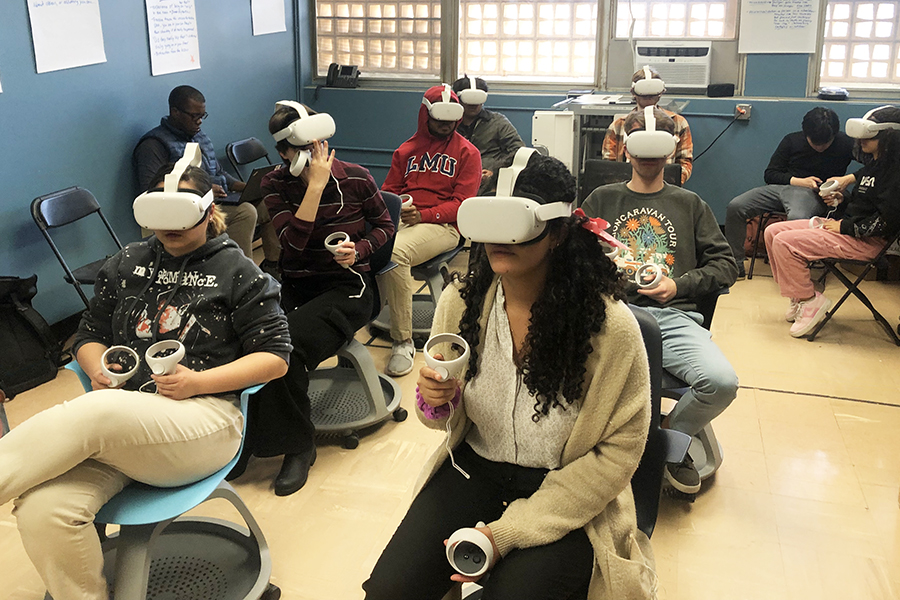
By Luna Isabella Bertolini ’23
A pilot class that employs virtual reality technology to approach a serious human resources situation gave film and business students a new appreciation for collaborative work.
“Virtual Reality in Business and Media” is led by Kelly Watson, clinical professor of management, whose scholarship has investigated the use of VR in HR informational videos about workplace microaggressions. The class explored how the creation of VR film vignettes about microaggressions – the final project of the course – could increase the impact of the videos. The vignettes aim to create a scenario where participants can experience increased empathy and compassion for victims of microaggressions as they take on the persona of a victim, an aggressor, and a bystander.
This interdisciplinary course, taught by Watson, Miranda Banks, Marc Pitre and Ana Carolina Estarita Guerrero, aimed to join the efforts of the business-focused study of microaggressions and the skills of filmmaking in 360 VR to create videos that increase empathy and understanding of microaggressions and their effects on workers.
Watson’s Ph.D. dissertation explored how VR enhanced feelings of community during the 2020-23 pandemic, and found that despite being in avatar format, people felt more connected via VR than they did in other platforms such as Zoom. VR conditions enhance the emotional experience as the individual’s attention is immersed into the film. She said that current HR informational videos are considered to be outdated and not engaging; the course therefore resolves this problem by immersing individuals into an experience of microaggression through a new media platform.
The course, open to undergraduate and graduate students from LMU School of Film and Television and LMU College of Business Administration, used Bloom’s Taxonomy, a framework for cognitive learning, to produce effective vignettes that achieved all six levels: knowledge, comprehension, application, analysis, synthesis, and evaluation.
The vignettes successfully fulfilled the learning goals of the course; students said they felt as though the class encouraged interdisciplinary work and experiential learning. Students also said their vignettes, for the most part, were able to reach all six levels of Bloom’s Taxonomy.
Guerrero encouraged SFTV students to partake in this innovative course because it would be exceptionally good in a portfolio.
“Attempting to create art in a new media source, such as VR, comes with challenges but also gives incentives to learn and overcome obstacles,” she said.
SFTV seniors Gabe Sheets and Christopher Putlock expressed how this pilot course was exceptional to their LMU experience. Sheets said the course felt collaborative between professors and students, and the power dynamic of a traditional classroom was erased when both students and professors experimented with new media sources and new material.
Guerrero said the course gave her a better understanding of microaggressions and their variability within the workplace. Watson, too, said she learned a lot about how to film in a 360 environment and the challenges that come with this media source. The course will most likely return in spring 2024 for SFTV and CBA students.



